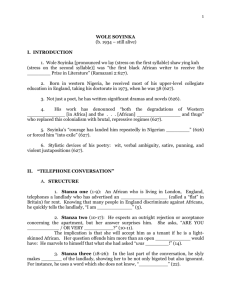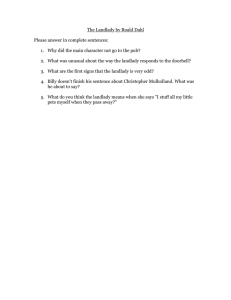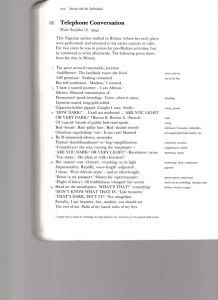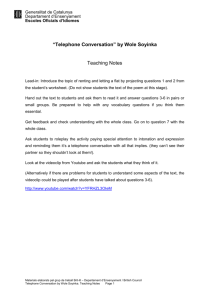Literary Analysis: Plath's 'Mushrooms' & Soyinka's 'Telephone'
advertisement
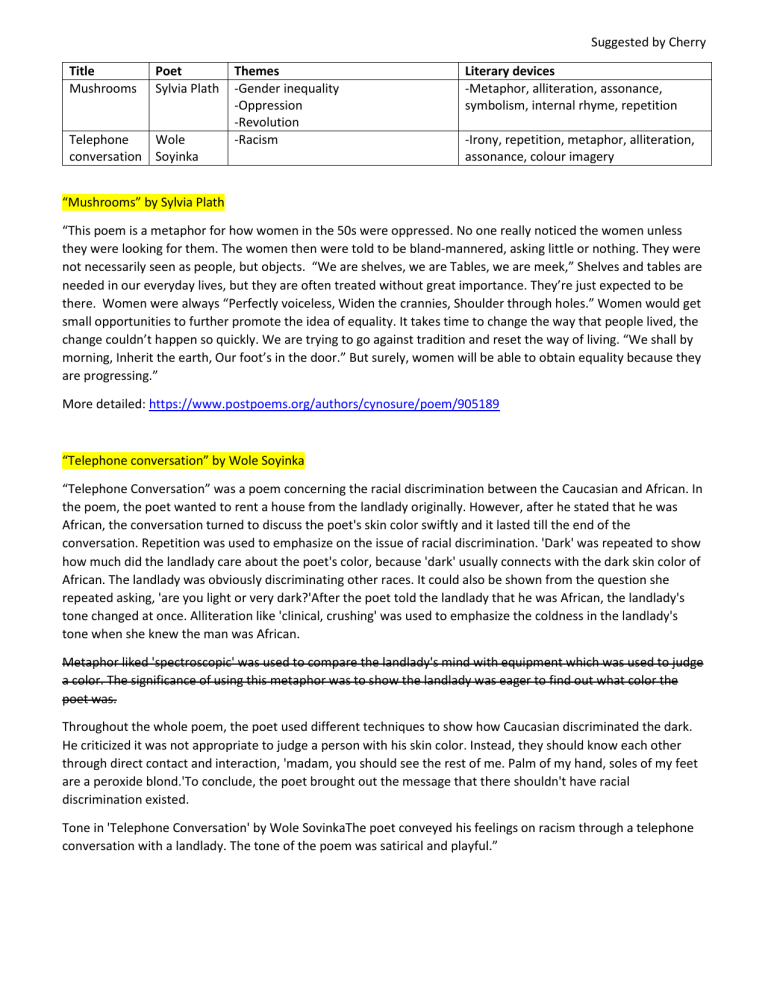
Suggested by Cherry Title Mushrooms Poet Sylvia Plath Telephone Wole conversation Soyinka Themes -Gender inequality -Oppression -Revolution -Racism Literary devices -Metaphor, alliteration, assonance, symbolism, internal rhyme, repetition -Irony, repetition, metaphor, alliteration, assonance, colour imagery “Mushrooms” by Sylvia Plath “This poem is a metaphor for how women in the 50s were oppressed. No one really noticed the women unless they were looking for them. The women then were told to be bland-mannered, asking little or nothing. They were not necessarily seen as people, but objects. “We are shelves, we are Tables, we are meek,” Shelves and tables are needed in our everyday lives, but they are often treated without great importance. They’re just expected to be there. Women were always “Perfectly voiceless, Widen the crannies, Shoulder through holes.” Women would get small opportunities to further promote the idea of equality. It takes time to change the way that people lived, the change couldn’t happen so quickly. We are trying to go against tradition and reset the way of living. “We shall by morning, Inherit the earth, Our foot’s in the door.” But surely, women will be able to obtain equality because they are progressing.” More detailed: https://www.postpoems.org/authors/cynosure/poem/905189 “Telephone conversation” by Wole Soyinka “Telephone Conversation” was a poem concerning the racial discrimination between the Caucasian and African. In the poem, the poet wanted to rent a house from the landlady originally. However, after he stated that he was African, the conversation turned to discuss the poet's skin color swiftly and it lasted till the end of the conversation. Repetition was used to emphasize on the issue of racial discrimination. 'Dark' was repeated to show how much did the landlady care about the poet's color, because 'dark' usually connects with the dark skin color of African. The landlady was obviously discriminating other races. It could also be shown from the question she repeated asking, 'are you light or very dark?'After the poet told the landlady that he was African, the landlady's tone changed at once. Alliteration like 'clinical, crushing' was used to emphasize the coldness in the landlady's tone when she knew the man was African. Metaphor liked 'spectroscopic' was used to compare the landlady's mind with equipment which was used to judge a color. The significance of using this metaphor was to show the landlady was eager to find out what color the poet was. Throughout the whole poem, the poet used different techniques to show how Caucasian discriminated the dark. He criticized it was not appropriate to judge a person with his skin color. Instead, they should know each other through direct contact and interaction, 'madam, you should see the rest of me. Palm of my hand, soles of my feet are a peroxide blond.'To conclude, the poet brought out the message that there shouldn't have racial discrimination existed. Tone in 'Telephone Conversation' by Wole SovinkaThe poet conveyed his feelings on racism through a telephone conversation with a landlady. The tone of the poem was satirical and playful.” “Mushrooms” by Sylvia Plath Overnight, very Tables, we are meek, Whitely, discreetly, We are edible, Very quietly Nudgers and shovers In spite of ourselves. Our toes, our noses Our kind multiplies: Take hold on the loam, Acquire the air. We shall by morning Inherit the earth. Nobody sees us, Stops us, betrays us; The small grains make room. Soft fists insist on Heaving the needles, The leafy bedding, Even the paving. Our hammers, our rams, Earless and eyeless, Perfectly voiceless, Widen the crannies, Shoulder through holes. We Diet on water, On crumbs of shadow, Bland-mannered, asking Little or nothing. So many of us! So many of us! We are shelves, we are Our foot's in the door. “Telephone conversation” by Wole Soyinka The price seemed reasonable, location Foolishly, madam--by sitting down, has turned Indifferent. The landlady swore she lived My bottom raven black--One moment, madam!"-sensing Off premises. Nothing remained But self-confession. "Madam," I warned, "I hate a wasted journey—I am African." Silence. Silenced transmission of Pressurized good-breeding. Voice, when it came, Lipstick coated, long gold rolled Cigarette-holder pipped. Caught I was foully. "HOW DARK?" . . . I had not misheard . . . "ARE YOU LIGHT OR VERY DARK?" Button B, Button A.* Stench Of rancid breath of public hide-and-speak. Red booth. Red pillar box. Red double-tiered Omnibus squelching tar. It was real! Shamed By ill-mannered silence, surrender Pushed dumbfounded to beg simplification. Considerate she was, varying the emphasis-"ARE YOU DARK? OR VERY LIGHT?" Revelation came. "You mean--like plain or milk chocolate?" Her assent was clinical, crushing in its light Impersonality. Rapidly, wave-length adjusted, I chose. "West African sepia"--and as afterthought, "Down in my passport." Silence for spectroscopic Flight of fancy, till truthfulness clanged her accent Hard on the mouthpiece. "WHAT'S THAT?" conceding "DON'T KNOW WHAT THAT IS." "Like brunette." "THAT'S DARK, ISN'T IT?" "Not altogether. Facially, I am brunette, but, madam, you should see The rest of me. Palm of my hand, soles of my feet Are a peroxide blond. Friction, caused-- Her receiver rearing on the thunderclap About my ears--"Madam," I pleaded, "wouldn't you rather See for yourself?"
